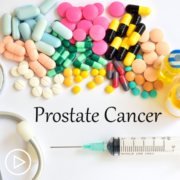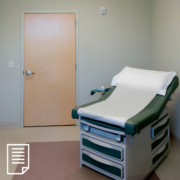Tools for Partnering in Your Prostate Cancer Care
Tools for Partnering in Your Prostate Cancer Care from Patient Empowerment Network on Vimeo.
Why is it important to partner with your doctor in your prostate cancer care? Dr. Rana McKay shares advice to help patients speak up and play an active role in their care plan.
Related Resources:

|

|

|
Transcript:
Katherine Banwell:
Why should patients feel confident using their voice in partnering in their care? Do you have any advice?
Dr. Rana McKay:
It’s absolutely important for patients to share their perspective and for there to be shared decision-making at every single juncture along the way. Even around decisions to not treat. So, you know, I think it’s a lot of – there’s a lot of grays in prostate cancer and a lot of art in deciding what treatment to do and at what specific time and for any given patient given the values that that patient brings to the table, they may come back with a different decision compared to another patient. So, without the patient you know, voicing what their values are it’s impossible to make a treatment decision.
So, it is so critically important to have that open communication with your clinician.
Katherine Banwell:
So, in addition to that – in conjunction with that, should men diagnosed with advanced prostate cancer consider a second opinion or consulting with a specialist?
Dr. Rana McKay:
I think it’s always a great idea to get a second opinion. You know, I think that, you know, it will only empower individuals when they seek sort of a second opinion to either confirm what their physician has already told them. And then they have reassurance that they’re on the right path or maybe provide some new novel insights that they can take into consideration and just think about how that could be applied to them. So, you know, I think that a second opinion is always really valuable.
I will balance that by saying sometimes it can be detrimental if there’s lots of opinions, because I will say that coming to a consensus when there’s lots of different specialists that are involved, and everybody makes the soup a little bit differently –
Katherine Banwell:
Yeah.
Dr. Rana McKay:
Sometimes that I think that can actually hurt patients in being able to actually come to a decision because then they’re like, “I don’t know what decision to make. This person said do this. This person said do that. This person said do that.” And so that can sometimes be detrimental. But a second opinion, I do always encourage it. I do always value it. But I always want the patient to bring it back to me so I can share with them and discuss, “Okay. I understand. This is why x said X-Y-Z. This still aligns. This still doesn’t.” They need a quarterback like you know, it’s one thing to sort of get second opinions. But I think every man with prostate cancer should have a quarterback that’s driving their care and advocating for them.
Katherine Banwell:
Yeah. How can patients find specialists near them?
Dr. Rana McKay:
So, I will say that they are national comprehensive cancer institutes. They’re all across the country in rural areas and not. I think, you know, finding the closest NCI-designated comprehensive cancer center close to you is probably a good place to start and identifying who is seeing patients with genetic urinary malignancies or prostate cancer at that facility is a good place. I think the Prostate Cancer Foundation is an excellent advocacy group for patients with prostate cancer. They have a tremendous amount of resources to help connect patients with clinicians, and other resources in their journey with cancer.










